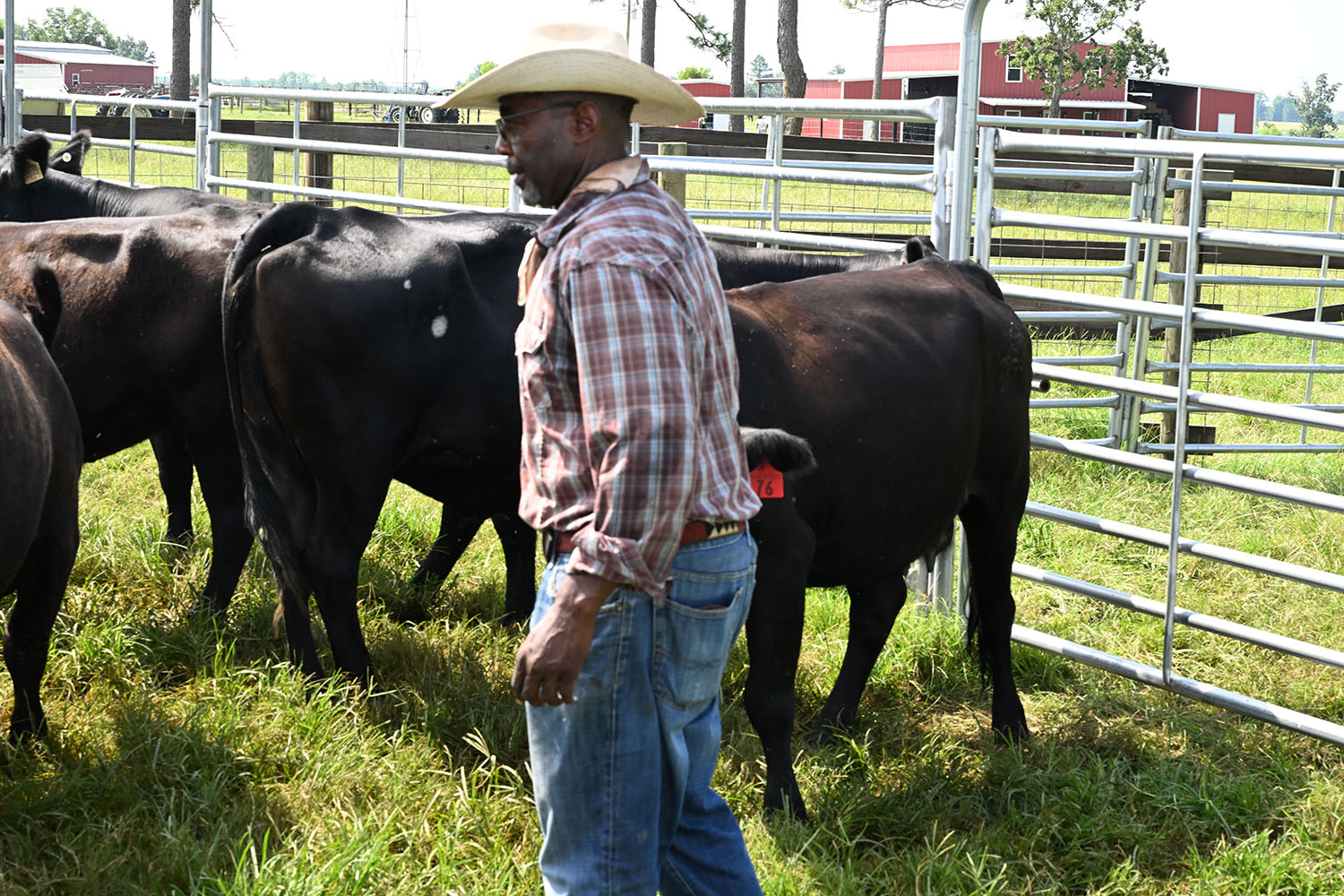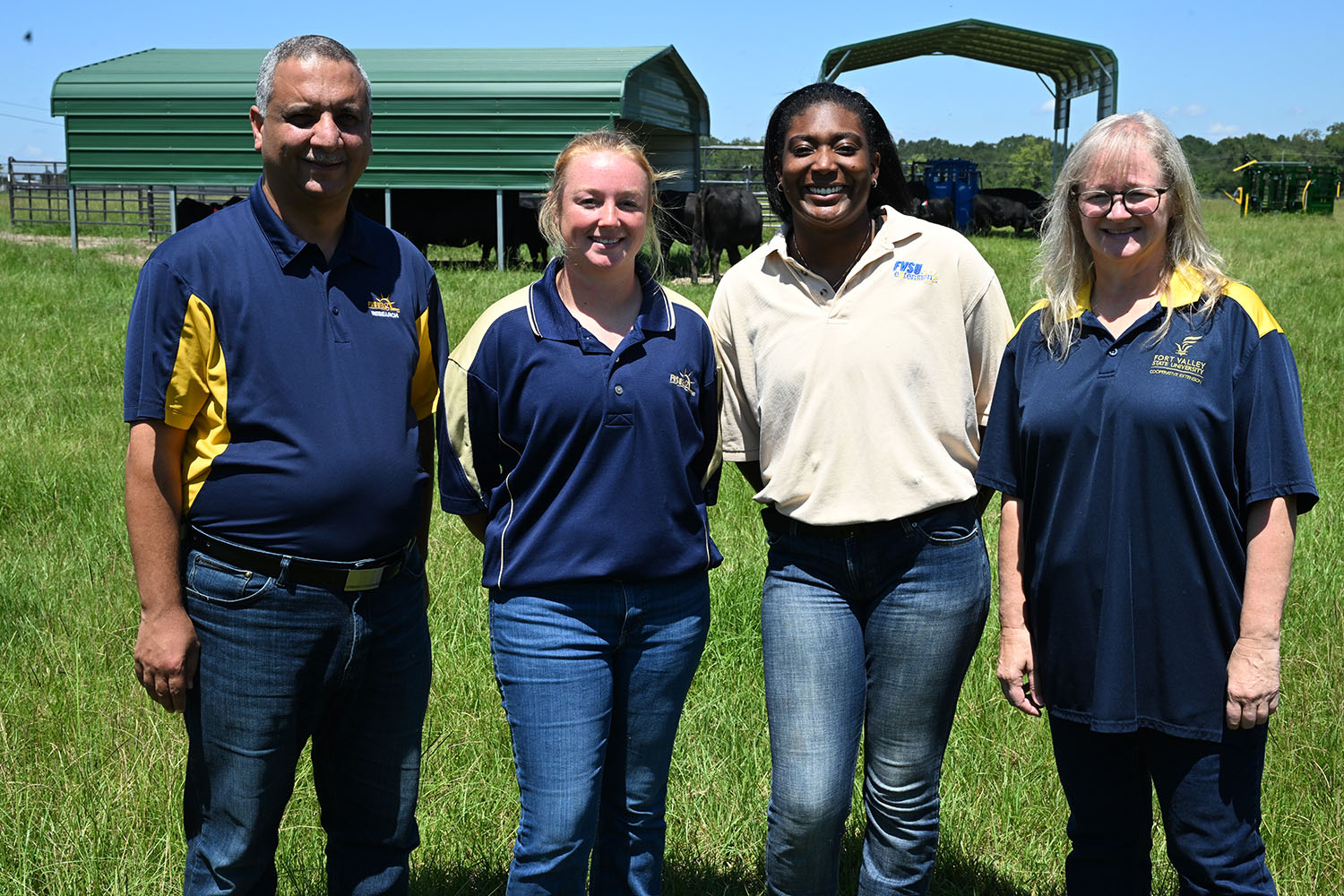News and Press
Prime Results
Posted on Oct 20, 2025 at 14:49 PM

Handy Kennedy Jr., owner of HKJ Ranch in Cobbtown, Georgia, relies on the expertise of FVSU Extension to maintain his cattle operation.
Farmers and landowners rely on land-grant universities like Fort Valley State University (FVSU) to develop solutions to improve their agricultural operations.
Handy Kennedy Jr., a cattle farmer and owner of HKJ Ranch in Cobbtown, Georgia, witnessed his production fall short using traditional breeding and management methods.
He contacted Niki Whitley, PhD, FVSU Extension specialist for animal science, and discussed the problem. Since 2019, Whitley and FVSU have worked with Kennedy and AgriUnity.
Whitley shared the information with Adel Moawad, PhD, FVSU assistant professor of animal science. Together, they concluded that artificial insemination may help Kennedy improve his livestock genetics. She briefly explained the importance of a research and Extension collaboration.
“Researchers can do applied research and test new technologies or methods of farming in real world situations which increases their opportunities for external grant funding and provides opportunities for student research projects. Extension gets the latest research-based information and/or technologies to share with producers. It’s also good public relations for FVSU,” Whitley said.
Recently, the two FVSU faculty combined their efforts to successfully impregnate several of the herd through fixed-time artificial insemination. Out of 37 cows inseminated, 27 carried calves, for a success rate of 73%. This information allowed Kennedy to know the number of pregnant cows needed to be separated from the ones that weren’t for economic reasons.
Moawad was not surprised with the outcome.
The Fort Valley researcher said at one point, particularly for beef cattle, the chances for success using artificial insemination was low. However, with the addition of multivitamins, food additives and other techniques, the pregnancy rate using artificial insemination has improved.
Whitley said that Kennedy and other beef farmers have benefitted from this project.
“This allows them to improve their herds without a large investment. Also, improving the quality of their animals helps them gain access to additional markets looking for higher quality of beef,” Whitley said.
Additionally, Moawad said that researchers collaborating with agents and clients can lead to positive results.
“We have a technique, and we’re working consistently to improve it. Transferring that information to the farmers through Extension is very good because they now know we can introduce artificial insemination to help them establish a good herd of cattle. This can be used to help them improve their production,” Moawad said.
Moawad also said it is important that students take part in such exercises. Whitley added that graduate and undergraduate research students get exposed to Extension work, which enhances their job prospects.
Lauren Wartley, a graduate student majoring in animal science is one of those students. She works for AgriUnity’s cattle division as a livestock specialist. Her duties include visiting different farms, assessing their needs and helping farmers improve everyday skills in maintaining their livestock.

(L to R) Adel Moawad, PhD, FVSU assistant professor of animal science, Terra Odom, animal science graduate student, Lauren Wartley, animal science graduate student and Niki Whitley, PhD, FVSU Extension specialist for animal science.
AgriUnity is an organization that helps ranchers raise value-added cattle. This allows ranchers to have access to multiple markets to sell their animals. The goal of AgriUnity is to help ranchers be successful by sharing experiences and best practices to help reduce mistakes and improve cattle operations.
Wartley, who completed her undergraduate degree in animal science at FVSU in 2021, began working for AgriUnity in 2024. The Columbus, Georgia, native said she has benefitted tremendously from working with the organization as a graduate student.
“I wanted to work with AgriUnity because I’m interested in becoming an Extension agent. I also enjoy working with them as a graduate student because I can apply what I learn in class to my training in the field,” Wartley said.
The FVSU graduate student also said working with AgriUnity has helped her improve her public speaking, exposed her to grant writing and allowed her to work with different agencies. She said she looks forward to helping AgriUnity with future projects.
Moreover, Kennedy added that Wartley’s work with AgriUnity is a welcomed asset to the organization and its members.
Kennedy describes a positive, long-lasting relationship with FVSU and University of Georgia (UGA) Extension. He said it is comforting to know that with a phone call or e-mail, he can access resources from Extension and research to help him solve a problem.
“They have really helped me take my farm from operating at a low profit margin to a recommended profit margin. The research, knowledge and skills that they shared has been invaluable to me,” Kennedy said.
He added that FVSU’s Extension and research programs have unlimited access to information pertaining to farming. Farmers can capitalize on those resources to improve their efficiency.
FVSU, the 1890 Land-grant University in Georgia, is committed to serving the needs of all communities and families through science-based educational, research and technology.
For more information about FVSU’s Cooperative Extension program, call (478) 825-6296 or visit ag.fvsu.edu.
- Categories:
- FVSU Agriculture College
- Tags:
- Extension
Media Contact
- Russell Boone
- Booner@fvsu.edu